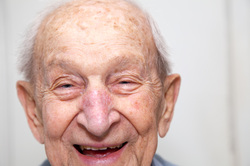
The elderly are most affected by their age than any other group. Massage therapy is proving to be a more valuable tool for influencing and controlling the adverse effects that come with this age.
Health is in a much frailer state in the elderly, and they could use the immune-boosting benefits of massage the most. Massage therapy reduces cortisol, the stress hormone responsible for killing white blood cells, by stimulating the pressure receptors under the skin. This in turn strengthens the weakened immune system.
With a decrease in health comes lack of physical activity. Massage therapy aids in improving the elderly’s range of motion by incorporating passive movements that allow them to get a better stretch. It also improves muscle coordination, balance and agility.
Massage therapy is particularly helpful for people who have or are undergoing treatment for a serious illness, such as cancer, by relieving the fatigue, pain and depression associated with it. It is especially beneficial for those afflicted with degenerative diseases, such as Alzheimer’s or dementia, by reducing agitation and calming the symptoms.
Massage also presents a need the elderly often lack: touch. Touch creates a nurturing bond that stems from caring, which can ease the effects of touch deprivation, such as irritability and lack of interest. It provides emotional support and companionship, which can have a significant impact on emotional well-being.
Massage is ultimately crucial for the elderly’s wellness, as it is one of the more natural and effective treatments to easing the effects of old age and providing a source of comfort.
Health is in a much frailer state in the elderly, and they could use the immune-boosting benefits of massage the most. Massage therapy reduces cortisol, the stress hormone responsible for killing white blood cells, by stimulating the pressure receptors under the skin. This in turn strengthens the weakened immune system.
With a decrease in health comes lack of physical activity. Massage therapy aids in improving the elderly’s range of motion by incorporating passive movements that allow them to get a better stretch. It also improves muscle coordination, balance and agility.
Massage therapy is particularly helpful for people who have or are undergoing treatment for a serious illness, such as cancer, by relieving the fatigue, pain and depression associated with it. It is especially beneficial for those afflicted with degenerative diseases, such as Alzheimer’s or dementia, by reducing agitation and calming the symptoms.
Massage also presents a need the elderly often lack: touch. Touch creates a nurturing bond that stems from caring, which can ease the effects of touch deprivation, such as irritability and lack of interest. It provides emotional support and companionship, which can have a significant impact on emotional well-being.
Massage is ultimately crucial for the elderly’s wellness, as it is one of the more natural and effective treatments to easing the effects of old age and providing a source of comfort.
 RSS Feed
RSS Feed

